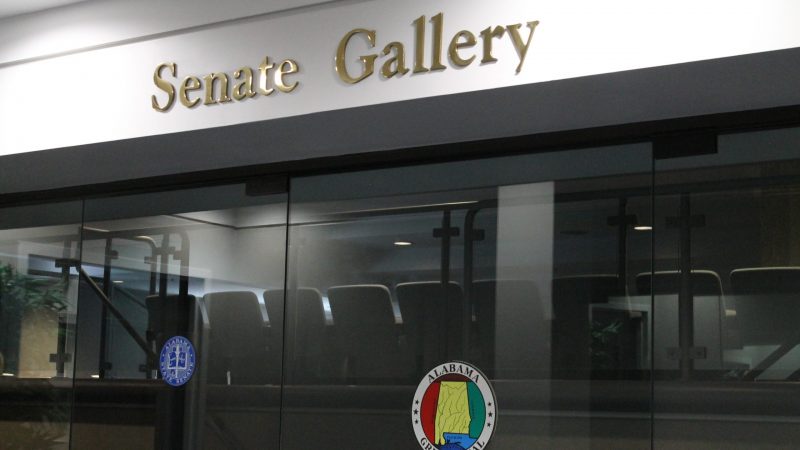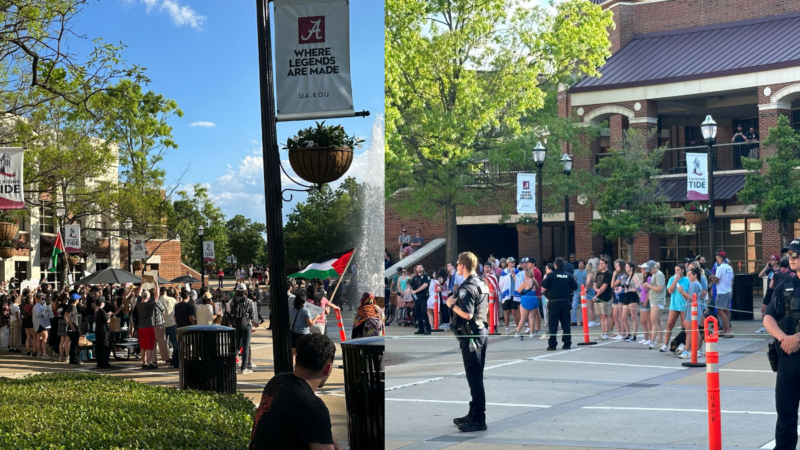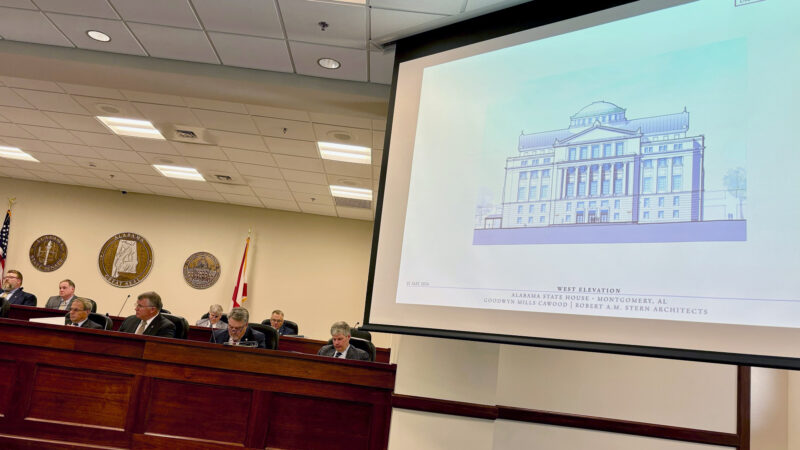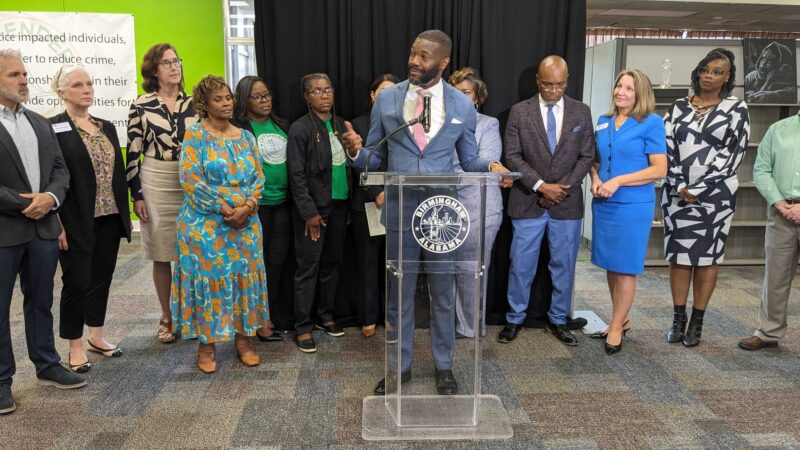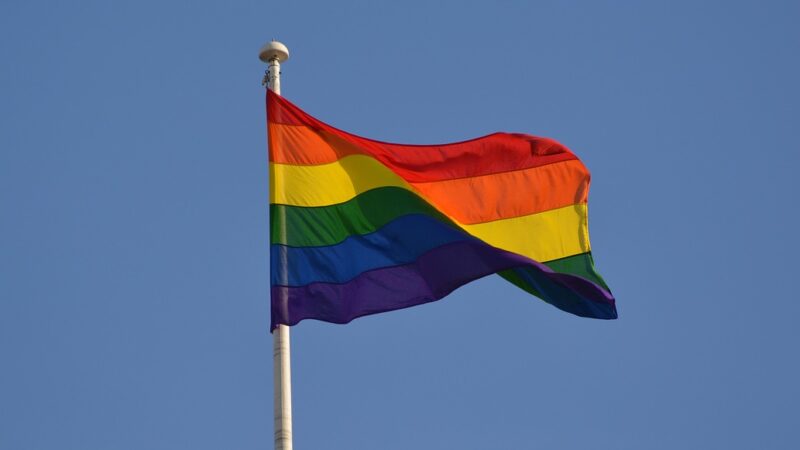Faith-based Voting
Yes, religion has a place there too.
Faith night at the Birmingham Steeldogs game, and on the field of the
BJCC, players practice kicking and throwing and tackling. Outside,
in the concourse and peppered in the stands, hundreds of spectators want
to see the special jerseys the players are wearing during practice.
“We have Samson for the front of our jersey,
and on the back, we have both old and new testaments, books of the bible
where the name would be.
That’s team owner Scott Myers.
“And what we’ve essentially done is we’ve
gone through and made sure that the number correlates with a positive
message from whichever book it is.”
You heard him right, biblical messages on team jerseys. Scripture where
threads meet gridiron, underscoring just how marketable religion – faith
– is in Alabama.
“If we were in a different market or in a
different location, we may have not set it up and did it this way.
But we’re trying to entertain our fans and the people that are here in
this community. We’re trying to get everybody involved in a big
faith night.”
But while religion plays a role on game day, it’s also found a niche on
election day. And all the days leading up to it.
On flyers, in your mailbox, with fancy script, candidates proclaim their
“Alabama values,” or their beliefs in God and country or their stances
on a myriad of social issues: gays, guns and abortion.
On radio and television, thirty-second spots are rife with coded
language, to make you know that these people are serious about their
beliefs.
It’s almost as if your faith is a criterion for being elected. Of
course it’s not, you can do or say whatever you want in a political ad,
but experts agree it’s the easiest soundbite for a vast majority of
Alabamians to digest.
“The religious infusion into the ad is
saying ‘I share your values.'”
Dr. Larry Powell is chair of UAB’s Department of Communication Studies.
He says it is a fine line between faith for good and faith for gain.
Where faith is in people’s lives and what they expect of the people who
represent them.
You’ve got to remember, particularly among
Republicans, there are four basic values that have been identified that
control political behavior: God, family, neighborhood and nation.
Notice that God is just one of those. But if you watch a good
commercial, quite frequently they’ll touch on two, three, four of those
things in a single ad.”
He says Democrats are still struggling to find ways to incorporate
religion into their message. But both parties feel the effects of
religion in one way or another.
A Pew Forum on Religion and Public Life survey found that about the same
percentage of people believe religious conservatives have too much
control over the Republican Party – 45% — as believe too many
non-religious liberals have control of the Democratic Party – 44%.
Dr. Powell and fellow UAB professor Eduardo Neiva co-authored their own
study that appeared in the March issue of the Journal of Communication
and Religion. The Pharisee Effect: When Religious Appeals in Politics Go
Too Far talks about the amount of religion in politics and whether
people can be turned off.
Neiva says historically – biblically – the two make for a polarizing
pair.
“Give to Caesar what belongs to Caesar
(those were Jesus’s words) yes. So, this is a secular world. The other
world is another thing. When you mix them, there is always the
potential for a huge confusion. And I think traditionally, although the
Republicans may have developed the coded words, the language, which
allows people to identify better than the Democrats, there is a huge
contradiction between religion and politics. I mean structural. This
goes way back to St. Augustine, who said, look, I’m not interested in
you guys. You guys, you secular people, you do your thing. My
relationship is with above.”
But religion has been a part of policy for as long as each has been
around. And according to Neiva and Powell’s study, there is the
potential for backlash if a politician gets too religious or appears
disingenuous.
Take for example Montgomery attorney Julian McPhillips, who ran for
Senate in the Democratic primary in 2002. He ran an ad on television
which featured his family at the dinner table saying the Lord’s prayer.
That was all that was in the ad. Well, then there was vote Julian
McPhillips for Senate.
“It was viewed as going too far.”
Again, Larry Powell.
“Instead of representing religion in the
political arena, it was viewed as using religion to gain political
advantage. And people don’t like it when it goes that far.”
When we contacted McPhillips, he said he didn’t want to publicly comment
on the ad, or the campaign – which he lost. But he did say he heard more
positive responses about the ad than negative.
Powell says former Alabama chief justice Roy Moore may’ve painted
himself into a similar religious corner before his campaign for
governor. For months, Moore has been lagging in all major GOP polls —
by as many as 49 points – behind Governor Bob Riley. Just two or three
years ago, Moore was being sought as a presidential candidate by some
minor national parties after he defied a federal court order to remove
his Ten Commandments monument from the Alabama Judicial complex.
What happened since then is what University of Alabama political
scientist William Stewart calls a case of split southern conservatism.
“You still have a conflict between what
we call religiously-oriented conservatives and economically-oriented
conservatives. Bob Riley, of course, is not bashful about his Christian
faith, but nonetheless, he is basing his appeal primarily on his ties to
economic conservatism, while Roy Moore is basing his almost entirely on
his association with religious conservatives. He’s the hero of
religious conservatives.”
And, despite what the polls say, Moore is the hero at the Steeldogs
game; remember Faith Night? Not surprisingly, those who support him –
the so-called ‘religiously-oriented conservatives’ believe there aren’t
enough faith nights – and days – in politics.
“They need to – like with the
Ten Commandments. That was ridiculous. That’s apart of the bible,
that’s apart of our life, that’s apart of our history. And that’s what
us as Christians live by.”
Another football fan says too much religion to him means too much
backlash imposed on people who are religious.
“You look at the situation with, you
know, like Roy Moore was going through. They brought too much emphasis
on something that is a good thing and they’re trying to make it a bad
thing. So, a lot of cases, religion plays too much of a role on
things.”
In other words, too many people knocking religion.
Whether or not those voices continue to be heard and whether moral
values and being God-fearing or Christian or Alabama-value sharing is
purely up to candidate and campaign. While some say it is essential to
move that message, its perceived tone, sincerity and focus could be the
deciding factor.
Gambling bill in doubt with three days left in the legislative session
Alabama lawmakers are coming down to the finish line for this year’s legislative session. Many bills await passage, but perhaps the biggest one up in the air is a lottery and gambling bill.
Pro-Palestinian demonstration draws counter-protest at University of Alabama
Students gathered demanding the school call for a permanent and immediate ceasefire and to push the school to sever ties with defense contractor Lockheed Martin.
A new Statehouse and related projects will cost about $400 million
The Alabama Legislative Council, a 20-member panel comprised of legislative leaders and their appointees, approved the construction of the new Statehouse last year. The panel was given an update on the project on Wednesday.
New pilot program will offer housing, resources to people leaving prison
The Birmingham Reentry Alliance will provide wrap around services to dozens of men and women adjusting to life after prison.
Alabama committee advances ban on LGBTQ+ pride flags in classrooms
The Senate Education Policy Committee voted 5-2 for the House-passed bill, putting the proposal in line for a possible final passage in the last four days of the legislative session.
A New Orleans garden paid hundreds of dollars in fees for a sewer that doesn’t exist
Galvez Garden owner Lissie Stewart has been fighting the New Orleans Sewerage and Water Board over inaccurate billing for years.

